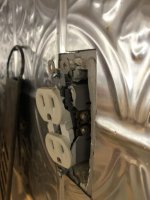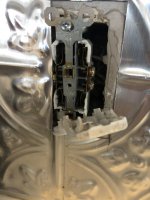That may not be a backwire receptacle, it could be a backstab that someone tightened the screws on, which does nothing for the push-in connection. The screws are provided for conventional (wrap the wire around the screw) installation, or when more than one wire needed to be connected.
If it's a backwire, loosening the screw will let the wire come out.
If it's a backwire, loosening the screw will let the wire come out.



